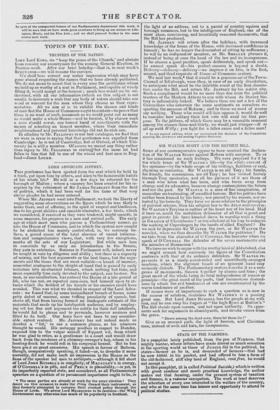LORD ADVOCATE JEFFREY.
This gentleman has been ejected from the seat which he held by a.trick, put upon him by others, and alien to the honourable habits of his whole life.* He will in a few days be returned for the borough of Mahon; -where a va.cancy.has been created for his re- ception by the retirement of Sir JAMES SCARLETT from the field of politics, which it had been well for the fame of that very clerer pleader he had never entered. . When Mr. JEFFREY went into Parliament, we took the liberty of suggesting some observations on the figure which he was likely to make there, and, of offering, in the spirit of respect and kindliness, due to his great abilities and amiable character, a few hints, which we considered, if received as they were tendered, might smooth, in some me.asure, his progress in a new and untried path. The early age at which most men who pursue a Parliamentary career, go into.the House of Commons, and to which the system now sought to be abolished has mainly contributed, is, we seriously be- lieve, a grand cause of the total absence of sound informa- tion and comprehensive views, that, with very few- exceptions, marks all the acts of our Legislature. But while men lose in essentials by so early an introduction to the Senate, they gain in extrinsics. Success in Parliament will, indeed, never be sought in vain by diligence and ability ; but there is a capacity of seizing, not the best arguments or the best times, but the argu- ments and the times that are most suitable—a knack of manner, somewhat analogous to the sleight-of-hand that is gained by early initiation into mechanical labours, which nothing but time, and more especially time early devoted to the subject, canlestow. No man, in our recollection, has entered the House at a late period of life, who has not, on repeated occasions, laid himself open-to at- . tacks which the feeblest of his friends or his enemies could have avoided. This was what we dreaded in respect of the Lord Advo- cate: we feared that, by some insignificant breach of forms, some petty defect of manner, some trifling peculiarity of speech, but above all, that from having formed an inadequate estimate of the materials that made lip his hotchpotch audience, and by employ- ing wit too fine and argument too subtle for their dull intellects, he would fail to please and to persuade, however anxious and fitted to do both. Our fears have not been to any consider- able extent realized. Mr. JEFFREY has not indeed made so decided a "hit," to use a common phrase, as his admirers thought he would. His unhappy position in respect to Dundee, exposed him to the vulgar assault of flippant wit, from which he was glad to retire, as a gentleman in a court suit would draw back from the insolence of a chimney-sweeper's boy, whom in his hunting-frock he would roll in his congenial kennel. But he has been great on great occasions. His speech in favour of Reform, though, comparatively speaking, it failed—or, to describe it more correctly, did not make. such an impression in the House as the fame of the speaker led men to, anticipate,—although it fell short of Lord Jolter RUSSELL'S in simplicity, of MACAULEVS in energy,. a O'CoarN.ELL's in pith, and of PEEL'S in plausibility,—is yet, in its imperfectly reported state, and considered, as all Parliamentary speeches on a question of so paramount importance Ought to be, in '* The same patties are already at work for the NEXT election ! They desire on this occasion to make the Privy Council their instrument, as they formerly attempted to compass their crooked policy through the House of Lords. We advise Lord MELBOURNE to be cautious—the Whig .Government may otherwise lose much of Its popularity in Scotland.
the light of an address, not to a parcel of country squires and borough nominees, but to the intelligence of England, one of the most close, convincing, and beautifully reasoned documents, that the Bill has produced.
Mr. JEFFREY Will return after the holidays, with increased knowledge of the forms of the House, with increased confidence in himself; he has no longer the discomfort of sitting by sufferance ; he will be an independent member, as Mr. SHELLEY phrases it, instead of being.at once the head of the law and its transgressor. If he choose a good position, speak deliberately, and speak out— he cannot speak ill—his perfect success is beyond a doubt. Delivery—delivery—delivery—we impress it on him, is the first, second, and third requisite of House of Commons oratory. We said last week,* that it would be a gracious act of the Town- Council of Edinburgh, were they, in case of an early dissolution, to anticipate what must be the infallible result of the first dissolu- tion under the Bill, and return Mr. JEFFREY for his native city. Such a compliment would be no more than due from the political trustees of the Modern Athens to one with whom its literary his- tory is indissolubly linked. We believe there are not a few of the Councillors who entertain the same sentiments as ourselves re- specting the measure of Reform ; and to these we need of course say nothing. Those who would still fain oppose it, would do well to consider how solitary their last vote will avail for that pur- pose. To the jobbers, of which there may be a venerable remnant among the chosen three-and-thirty, we would just whisper—It is all up with Willy ; you fight for a fallen cause and a fallen man!
* In our second edition, when we announced the decision of the Committee ejecting Nr. JEFFREY and seating Captain OG/LVIII.


























 Previous page
Previous page